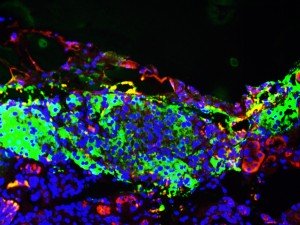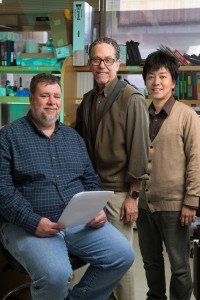Salk scientists have solved a longstanding problem in the effort to create replacement cells for diabetic patients. The team uncovered a hidden energy switch that, when flipped, powers up pancreatic cells to respond to glucose, a step that eluded previous research. The result is the production of hundreds of millions of
For more than a decade, scientists across the globe strived to replace failing pancreatic beta cells linked to immune destruction in children (type 1 diabetes) or
«We found the missing energy switch needed to produce robust and functional human beta cells, potentially turning this discovery into a viable treatment for human diabetes," says Ronald Evans,
 The Salk technology begins with induced pluripotent cells (iPSC), a stem cell technique where tissue from a
The Salk technology begins with induced pluripotent cells (iPSC), a stem cell technique where tissue from a
«Pancreatic beta cells must be able to do two things to work effectively: respond to glucose and produce insulin," says Evans, who is also a Howard Hughes Medical Institute investigator and the March of Dimes Chair in Molecular and Developmental Biology. «No one had been able to figure out how to make pancreatic cells from human patients that can do both until now.»
 The Salk team closely studied the basic biology of a beta cell and uncovered several molecular switches, called transcription factors, that were switched off but might control the transition to a fully functional state. The ‘secret sauce,’ the Salk team found, was one particular switch the Evans lab had studied for years for its role in cell signaling. This protein switch, called
The Salk team closely studied the basic biology of a beta cell and uncovered several molecular switches, called transcription factors, that were switched off but might control the transition to a fully functional state. The ‘secret sauce,’ the Salk team found, was one particular switch the Evans lab had studied for years for its role in cell signaling. This protein switch, called
«This advance will result in a better controlled insulin response than currently available treatments," says Michael Downes,
 «When we added
«When we added
But can these beta cells successfully treat diabetes? The Salk researchers found that, indeed, when the matured beta cells were transplanted into type 1 diabetic mice, the procedure quickly rescued their diabetes. «Hopefully, this mirrors what would happen in the
The researchers hope to move to human trials within the next few years.
Other authors on the paper were Zong Wei, Chun Shi Lin, Sungsoon Fang, Maryam Ahmadian, Yasuyuki Kida, Tiffany Tseng, Yang Dai, Ruth T. Yu and Annette R. Atkins of the Salk Institute; and Christopher Liddle of the University of Sydney.
The work was supported by the National Institutes of Health, the Glenn Foundation for Medical Research, the Leona M. and Harry B. Helmsley Charitable Trust, Ipsen/Biomeasure, California Institute for Regenerative Medicine (CIRM), The Ellison Medical Foundation, and by gifts from Steven Kirsch and Steven and Lisa Altman.
Source: http://www.salk.edu/news-release/salk-scientists-find-secret-sauce-for-personalized-functional-insul...

